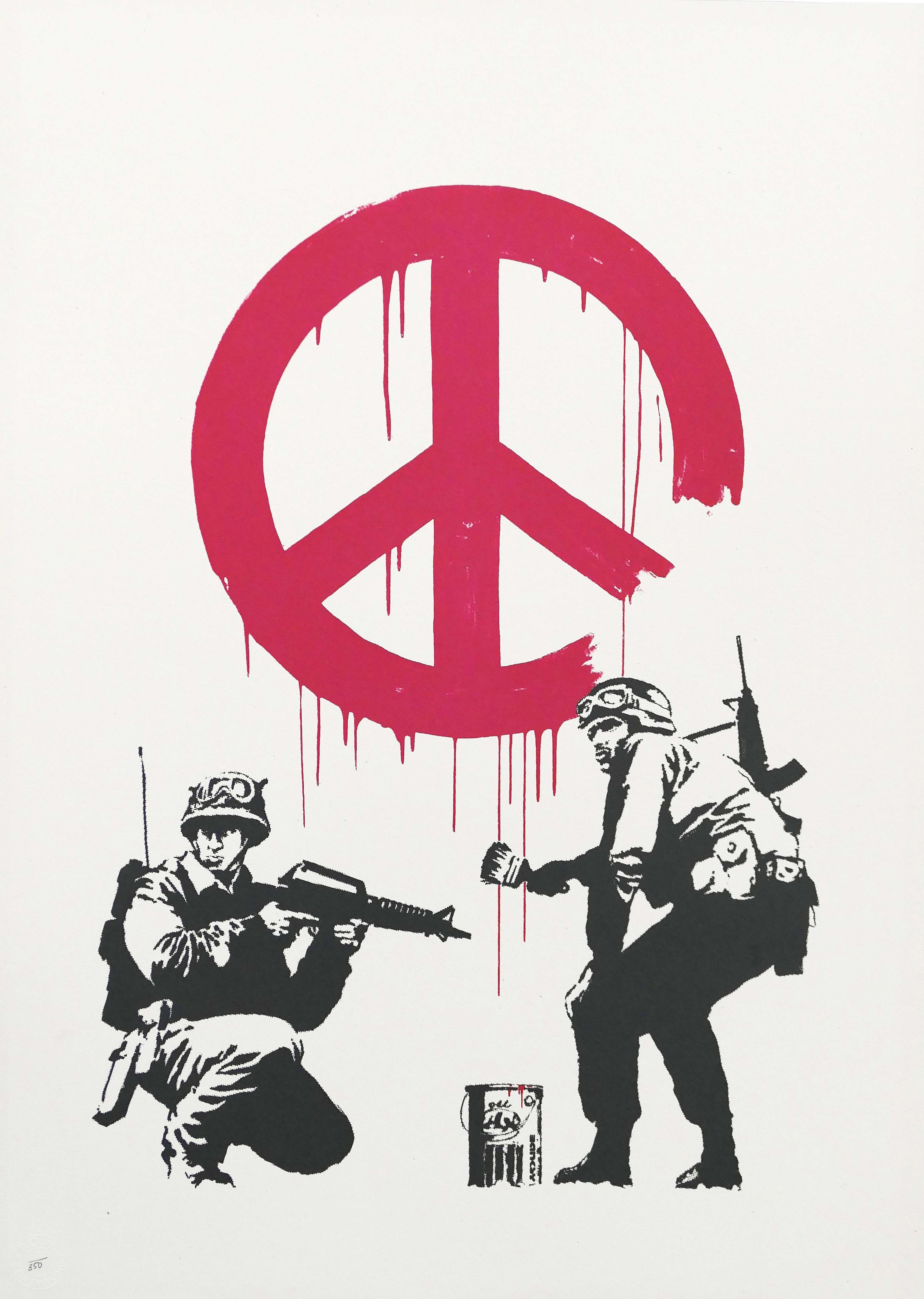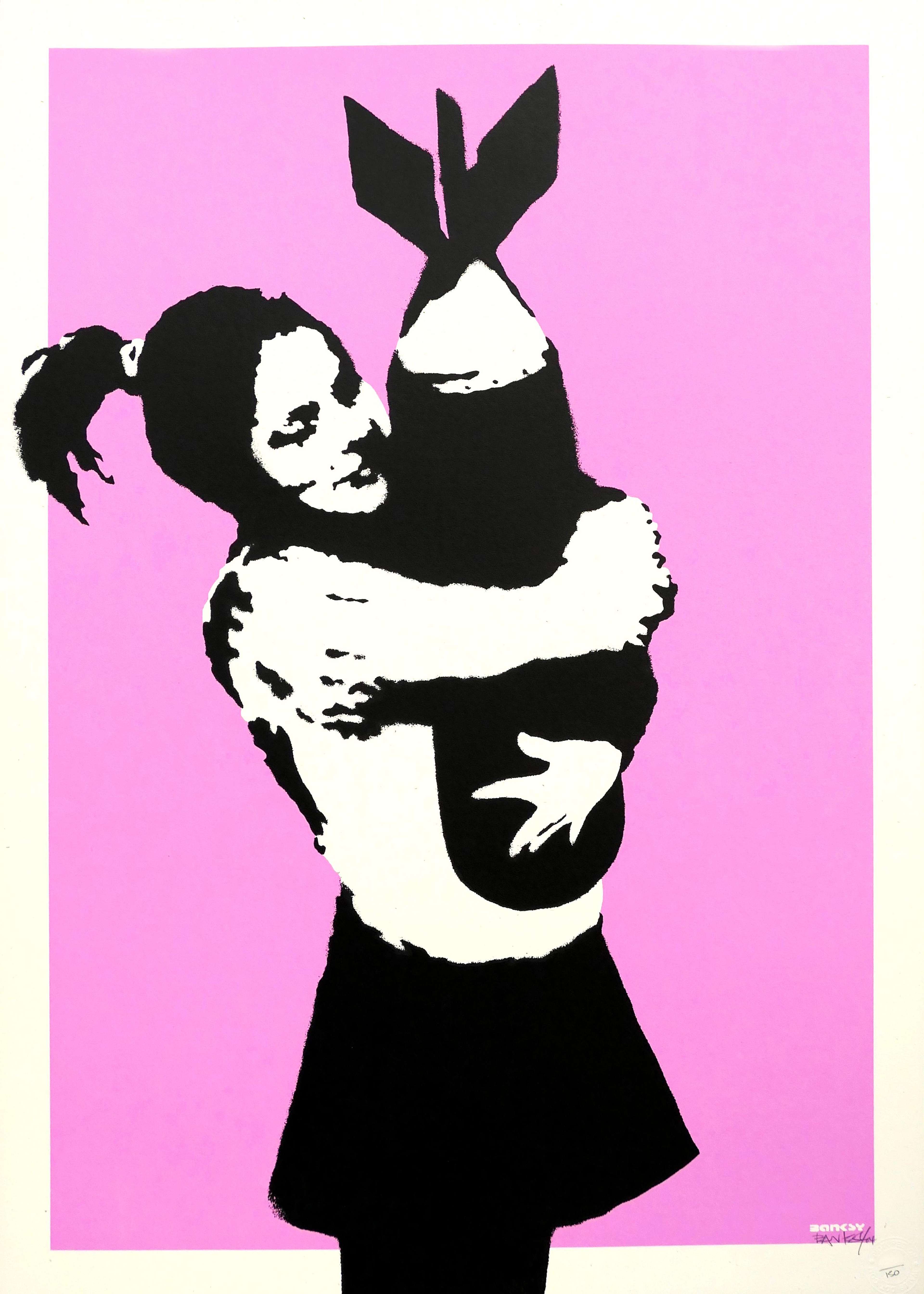Banksy For Ukraine: New Prints for International Conflict Charity
 "Fragile" in Aid of Legacy of War Foundation © Banksy 2022
"Fragile" in Aid of Legacy of War Foundation © Banksy 2022
Banksy
270 works
In addition to his series of murals in Ukraine, located from Kyiv to Borodyanka, Banksy has further expressed his solidarity with the country following Vladimir Putin’s invasion, by releasing a new artwork in print form and raising money for international charity, the Legacy of War Foundation.
Having not released any print editions for sale since his 2019 Gross Domestic Product, Banksy is back on the press having created a highly exclusive edition of 50 new prints to raise money for an aid organisation, Legacy of War, currently working to support Ukrainian civilians affected by the ongoing war. The street artist announced the edition via his Instagram page on the 9th December, accompanied by an image of the new work. The print, which appears to be executed on cardboard, features the side of a shipping box, marked fragile, with a falling rat—or mouse—scratching down the print.
The new work reiterates the artist’s continued antipathy towards his own fame. Where he could easily be producing works consistently, to his credit, he increasingly only releases work with strong political or humanitarian intent, ensuring he produces art that really matters.
What does Banksy’s latest print, in aid of Ukraine, mean?
A nod to his long-running rat motif, the rodent featured in the new work seems in fact to be a mouse but it represents nevertheless the same chaotic, defiantly autonomous tendencies as his rats: “Rats are the triumph of the little people, the undesirables and the unloved. They are the ultimate role model.” As is typical of Banksy’s work, the print seems to offer various meanings simultaneously. Overall, the box’s shipping label, reading “FRAGILE”, makes a clear declaration about the state of affairs in Ukraine in particular, the country’s infrastructure that so desperately needs the fortification of aid.
The mouse’s freefall adds a layer of human poignancy. Often using rodents as stand-ins for ordinary people, Banksy’s falling mouse in this print ambiguously seems at once to be in a desperate situation, as it claws at the side of the box to catch itself, and to be an escapee. If the shipping box is at all a nod to the UK and other European countries’ welcome of Ukrainian refugees after long voyages, the mouse is shown to be literally ‘escaping the box’ of stereotypical views of asylum seekers as fragile, and purely victims of circumstance.
Ultimately, though the mouse is in freefall, it scratches out the first two letters of the “FRAGILE” label, in a nod to the national spirit of Ukraine, which has been centre-stage in the ongoing war. While Ukrainians have been subject to a clear raid on their liberty, and all the horrors of conflict inflicted on a comparatively small nation, they have shown nothing but resilience that certainly justifies scratching out any labelling of them as passive or fragile and describing them and their quick adaptive response to the war as “agile”.
What does the charity, Legacy of War, do?
Reading from the charity’s homepage, they state that, ‘In 2022 we launched an extensive Ukraine Crisis Response, working closely with partners on the ground to provide targeted support for vulnerable communities including adults and children with disabilities, and internally displaced people. So far we’ve delivered over £240000 of grants and specialised aid.’
Banksy explained his selection of the Foundation to be recipient of his fundraising efforts via his personal experience of the charity when he was in Ukraine earlier this year, creating seven new murals in solidarity, which you can read about here. Recalling his encounter humorously, Banksy stated on the charity’s website: "In Ukraine, I saw a Legacy of War team sweep in and provide medical attention, heaters, fresh water and a friendly face to some very desperate people in a bombed-out building. They also lent me one of their ambulances to work from, which turned out to be extremely useful when an angry babushka found me painting on her building and called the Police. I feel the least I should do is raise enough money to replace the number plates on the ambulance I hotted up."
Humour aside, it is likely that Banksy chose the charity because it is providing vital infrastructure support, with an emphasis on helping the most vulnerable, and because, as well as providing aid, it also actively campaigns against war— both of which are sentiments Banksy emphatically supports.
 Mural (Borodyanka, Ukraine) Banksy © 2022
Mural (Borodyanka, Ukraine) Banksy © 2022Banksy’s Opposition to War
Banksy has a long history of creating anti-war murals and artworks throughout his career from a figure throwing a bouquet of flowers in Love Is In The Air, to the peace sign painted by soldiers in CND Soldiers. One of Banksy’s most pertinent anti-war images is of a young girl clutching a missile to her chest in Bomb Love, creating an alarming juxtaposition between the violence of war and the innocence of childhood. Children are repeatedly used by Banksy as symbols of hope and innocence, depicted in juxtaposition to the horrors of war and violence - the limited-edition print Kids on Guns being another example of Banksy’s abilities to manipulate our expectations and prod our emotional receptors when it comes to our experiences of war.
How much are the new Banksy Ukraine prints on sale for?
Banksy’s prints were offered for a mere £5,000, which seems arguably a steal when one considers that Banksy prints on the secondary market regularly sell for upward of £10,000. But the figures Banksy is raising with his prints can hardly be considered ‘mere’ when totted up: with all 50 prints snapped up already (but yet to be allocated), Banksy will be contributing a total of £25,000 to the charity, in addition to covering production costs himself.
The low price-point is testament to the artist’s committed stance, especially in recent years, on making his artworks accessible. Not one to shy away from deriding the astonishing prices his works fetch on the secondary market, as in his print Morons, Banksy likely wanted the print to be a philanthropic opportunity for a broader range of people, as well as to offer a greater variety of people the chance to own his artwork. This much is apparent, too, in the randomised lottery which will select buyers following registration.
That Banksy has created such an exclusive edition—where in the past he would frequently offer editions of 150 prints—and at a relatively affordable price per unit, makes us wonder if he intends to release more prints for a greater price soon. While this is only our speculation, Banksy is known for prolifically producing artist’s proofs, often in new colourways; perhaps he has even more exclusive versions of “Fragile” in store, aware, as ever, of the willingness of collectors to pay great sums of money for his art.
How do I buy Banksy’s newest print?
Unfortunately, the prints were only available via a registration system which has now closed.
Potential buyers were invited to register through the Legacy of War website at a new, dedicated address: https://banksy.legacyofwarfoundation.com/. Sadly, for those not hot off the blocks, the webpage now reads “Registration Now Closed” and states that the charity is in the process of sifting through applications, which were numbered above a staggering 1 million in total.
Some day we may see some of Banksy’s latest print—which we are calling Fragile until Banksy or his authentication body, Pest Control, declares otherwise—filter through onto the secondary market. For now, it is likely that those who are selected to play their part in supporting the cause will treasure their prints as an extraordinarily special piece of art— not only aesthetically valuable, but valuable for humanitarian reasons, too.
However, as in the case of prints sold through Gross Domestic Product, his most recent print release preceding this latest, Banksy has set out terms and conditions to discourage buyers from reselling their new prints before a set period has elapsed. By establishing a 2-year period during which no authentication certificates will be issued by his board, Pest Control, Banksy discourages prospective buyers who merely want to ‘flip’ Banksy’s new works— gaining selfishly from markups on what is supposed to be a philanthropic purchase. It is also established on Legacy of War’s website that any prospective buyers found to be advertising their prints for sale before or during purchase will be automatically barred. Ultimately, it will be at least two years before the prints are available to buy second-hand for those unlucky in the first case.
Legacy of War Website subject to attacks by Russian IP Addresses
As well as sharing the sheer scale of the response to Banksy’s latest print, Legacy of War gave an insight into the pressures they have faced in its wake by acknowledging the “3,500 hostile attacks from Russian IP addresses” their website has been subject to.
Of course, it is unknown who exactly carried out these cyber-attacks, it would not be unheard of for the Russian authorities to be involved in weaponising digital media politically. In the past, evidence has arisen to support Russia’s use of bots to spread misinformation preceding other nation’s elections. We are thankful, foremost, that the charity’s work has not been hindered by these attacks, but it speaks to Banksy’s artistic capacity to strike right to the core of a political issue, provoking attacks and contention wherever he leaves his mark.
Since the creation of his Ukraine murals, Belgian author Marc Pairon published a book titled BANKSY IN UKRAINE - F*CK PTN! that documents the seven murals Banksy created in Kyiv. All proceeds from the book’s sales are directed toward rebuilding Ukrainian schools, underscoring the philanthropic intent behind Banksy’s art amid the ongoing conflict.
As well as this, Ukraine has commemorated the first anniversary of Russia’s invasion by issuing a postage stamp featuring a mural by Banksy. The artwork, painted on the ruins of a building in Borodianka, depicts a boy triumphing over a grown man in a judo match. The image is widely interpreted as a nod to Russian President Vladimir Putin, a known judo black belt, with the boy symbolising Ukraine's resilience. The stamp includes the phrase “FCK PTN” in Cyrillic, adding a defiant message. Residents of Kyiv eagerly lined up to purchase the stamps, underscoring the artwork’s significance as a symbol of Ukrainian strength and resistance.
Watch Banksy's video about his time in Ukraine:
Read about Banksy's Ukrainian Murals here.






